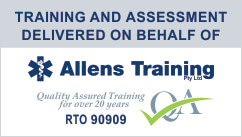First Aid and CPR Training available on the Northern Beaches
First aid: Australia has lowest rate of training, says Australian Red Cross
ABC Radio Sydney By Amanda Hoh
Posted 13 Sep 2017, 7:00am
Girls arms doing CPR on man lying on his back
PHOTO: Performing CPR involves repeating 30 chest compressions followed by two breaths. (ABC RN/Cathy Johnson)
RELATED STORY: Firefighters armed with new CPR skills to help save each other’s livesRELATED STORY: Snakes out in Sydney due to warm weather and urban sprawl
Do you know what to do if someone burns themselves with hot water at home?
What about if your child drinks something poisonous or stops breathing?
Australia has the lowest rates of first-aid training in the world, according to the Australian Red Cross, with less than 5 per cent of people trained in how to handle an emergency situation.
Almost 500,000 Australians are admitted to hospitals every year as a result of injury, with around 12,000 dying from their injuries, primarily from falls.
Most injuries occur in the home, followed by the workplace.
“Workplaces offering first aid is low,” Red Cross spokeswoman Amanda Lindsay said.
“They might encourage their staff to do first-aid training, but paying for first-aid training, only 50 per cent of Australian workplaces [do so].
“Giving someone the confidence to perform first-aid duties in the workplace is important.”
Know how to perform CPR
Learning how to tend to someone who has suffered a cardiac arrest is one of the key skills in an emergency situation.
More than 33,000 Australians suffer cardiac arrest each year, and only 5 to 7 per cent survive.
First aid sign
PHOTO: Keep a first-aid kit at home and in the your vehicle and replace expired items. (ABC News: Freya Michie)
The longer you delay cardiopulmonary resuscitation, the less chance of survival.
After 10 minutes, the survival rate drops substantially.
“Keeping the blood flow to the vital organs and the brain is so important,” Ms Lindsay said.
“You’re there as a first responder, you’re not a paramedic, you’re not a doctor, but you’re there to respond to the incident straight away to give them the best chance of survival.”
Not just about treating a person
For ABC Radio Sydney caller Stephen, knowing first aid was a big help when he witnessed a car accident in the 1970s and the skills have stuck with him since.
First-aid training was offered as part of his job.
“There was a pregnant lady sitting on the side of the road. I thought, ‘be calm, assure everyone’. I called the ambulance and got the medics. Calmness was one of the aspects [of first aid].”
For Phil, receiving infant first-aid training when he had his children was invaluable.
“Something that stuck with me was that you may not be able to resuscitate a child or an adult, but it’s about keeping it going until emergency services get there, because you can keep blood flowing to their brain by keeping the oxygen going. You might not see the results but there’s still something going on in there that is saving their life.”
Ms Lindsay encouraged all parents and carers to undertake a first-aid course.
The Red Cross also recommends keeping your first-aid training certificate up to date and to keep a well-stocked first-aid kit at home and in your vehicle and regularly replace expired items.
How do you treat:
Cardiac arrest
If possible use a defibrillator, which many workplaces make available. Otherwise start CPR, which involves 30 chest compressions followed by two rescue breaths. Repeat at a rate of 100 to 120 compressions per minute.
Burns
The Red Cross recommends putting the burn area under cool running water for 20 minutes. If there is an open wound, apply a non-adhesive dressing; if it’s larger than the palm of the person’s hand, get them to hospital straight away.
Choking
The Heimlich manoeuvre which thrusts the person from around the abdomen is no longer recommended. Perform five back thrusts in between the shoulder blades. If the item hasn’t been dislodged, five chest thrusts. Encourage the person to cough if they can still breathe.
Poisons
Don’t encourage the person to vomit. Call the poison hotline straight away on 13 11 26. Each poison will have a standard way of proceeding.
Snake bites
Apply the pressure immobilisation technique by bandaging below the snake bite to the top of the snake bite as tight as you can. Keep the affected body part still.
Book a course on the Northern Beaches of Sydney. We can increase the rate of training and keep our Northern Beaches a safe place. Simple Instruction first aid and CPR training is offering Nationally Recognised Training at the Dee Why RSL 10 to 15 times per month at a time that suits you.
Book a First Aid or CPR course on the Northern Beaches to get the accredited training course that suits your needs. HLTAID003 Provide First Aid – for all industries, Cardiopulmonary Resuscitation CPR HLTAID001 in high risk industries and Provide an emergency response in an education and care setting HLTAID004 for Child care workers or those studying a Certificate 3 at TAFE.
www.simpleinstruction.com.au
Recognised by Allen’s Training PTY LTD RTO 90909
